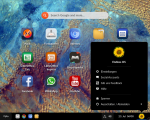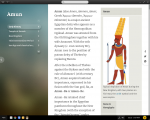Optimizing Trisquel for Offline Computing
- Inicie sesión ou rexístrese para enviar comentarios
EndlessOS is designed to provide a good offline computing experience.
What could be done to implement something similar on Trisquel?
I'd like some things to update when internet is available, but for
everything to generally work in offline mode, and for a good library of
general information available on the computer's disk. Dictionary,
encyclopedia, music, videos, etc.
I had never heard of EndlessOS, so I downloaded the 16.5 GB ISO and tried it in a VM.
It could be useful as a restricted "Prison OS" for inmates in a correctional facility where everybody is basically incommunicado, cut off from access to the outside world.
I think that even the criminal system would be better off with a Free Libre system that respects user's freedoms.
https://trisquel.info/files/Screenshot%20from%202020-07-23%2016-00-21.png
https://trisquel.info/files/Screenshot%20from%202020-07-23%2015-37-02.png
https://trisquel.info/files/Screenshot%20from%202020-07-23%2015-33-12.png
https://trisquel.info/files/Screenshot%20from%202020-07-23%2015-46-03.png




I just don't have internet. Not a prison or anything. O_O
--
Caleb Herbert
KE0VVT
(816) 892-9669
https://bluehome.net/csh
In Cuba, they use "paquetes semanales", that is, sneakernet. File sharing on USB storage.
https://en.wikipedia.org/wiki/El_Paquete_Semanal
The whole Wikipedia can be downloaded as a compressed file about 16 GB.
https://en.wikipedia.org/wiki/Wikipedia:Database_download
The "prison" suggestion was real: people inside should have a way to browse information albeit without an Internet connection.
On 23.7.2020 12:24, name at domain wrote:
> In Cuba, they use "paquetes semanales", that is, sneakernet. File
> sharing on USB storage.
>
> https://en.wikipedia.org/wiki/El_Paquete_Semanal
Yes, I was thinking of something like that.
--
Caleb Herbert
KE0VVT
(816) 892-9669
https://bluehome.net/csh
The answer is "NO", the long asnwer is why it is "NO"
Free Software is the only software that respects users' freedom and their communities' freedom.
That is why community is related with network science.
My solution is AGPLv3+
Happy hacking.
>restricted "Prison OS"
and
>Free Libre system that respects user's freedoms.
These things don't really belong together. If the OS is "jailed" similar to iOS/Playstation/Xbox/Nintendo, where user doesn't have root control, then can it be Free Software? What if the prison doesn't give things like the source code?
By definition if it restricts root access and source code, then it can't be Free.
Now, if they were actually given FREE software, and restricted in the internet. This OS could be given to everyone on tablets, especially with things like the encyclopedia, and give prisoners an offline way to transfer media on to it. All good stuff, would improve literacy / knowledge / (probably even reduce prison rape, once some clever cookies find a way to score porn)
Would never happen where this is needed the most though, America has so many inmates but the focus is monetary and often the shitty mp3 and CD players they sell come loaded with DRM that are lining some company's pockets right now. It would be an uphill battle to give inmates actual rights, against lobbyist groups.
Software can be free libre while access to the network is limited at the same time. They are not mutually excluding.
Simply, they give the inmate the tools needed to browse the intranet or local files, but the wide area network is out of reach.
Only restrict as little as absolutely necessary to make the service work inside the prison system while not risking security. It could be supervised or time-restricted, or based on behaviour and earned points. If abused, the privilege can be revoked at any time.
>Simply, they give the inmate the tools needed to browse the intranet or local files, but the wide area network is out of reach.
The people taking advantage of the current monetized system won't allow for that. I do agree with your stance though!
On Thu, 23 Jul 2020 02:47:35 -0500
Caleb Herbert <name at domain> wrote:
> EndlessOS is designed to provide a good offline computing experience.
> What could be done to implement something similar on Trisquel?
>
> I'd like some things to update when internet is available, but for
> everything to generally work in offline mode, and for a good library
> of general information available on the computer's disk. Dictionary,
> encyclopedia, music, videos, etc.
I guess Trisquel can make another version like it has "Trisquel Sugar
TOAST", preinstalled with all those applications EndlessOS is talking
about.
But I think there is nothing special about it, looks to me any other
GNU/Linux distro(based on Debian/Ubuntu). From EndlessOS website[1]:
> Endless comes with more than 100 free apps and powerful tools that
> don’t require an Internet connection.
Trisquel can add some of these "apps" within the ISO, but that will
make the system more bloated. But it can make people aware of
existance of those software(without preinstalling it) so that they can
install later with their own choice.
> Endless is designed to feel natural and intuitive, making it easy to
> use even if you have little or no computer experience.
It mainly falls in the domain of desktop enviroments. Trisquel already
supports MATE and KDE, I think those desktop enviroments already give
a good user experience. But do you have anything else in mind?
> Endless is free to download, and software updates are automatically
> included. It's also virus-resistant, saving you money at every step.
Just standard GNU/Linux features. But I'll note that EndlessOS is
considering only practical benefits of GNU/Linux e.g., saving money
etc. The "virus-resistant" thing is misleading, GNU/Linux is NOT
"virus-resistant".
When watching the their promotion video, I noticed that they are
talking about offline encyclopedia. But it looked Wikipedia to me. So
I searched the internet and found this libre software called
XOWA[2]. It is a offline wikipedia client. Trisquel can pre-install
something like this.
Stardict[3] is an example of Offline dictionary. This can be
pre-installed in Trisquel for offline dictionary functinality. I
personally used the CLI version of it known as sdcv[4].
I also noticed that they have included things software(articles?) that
teach "cooking, parenting" etc. I don't know how they are doing
it. Any ideas? But more importantly are those information under a free
license?
Then the video shows LibreOffice softwares, and software for video and
audio editing. Those can be pre-installed too, but as I said before
that makes things more bloated, ISO size probably reach 3.5 GiB.
> There are video, lectures and contents for subjects like
> Programming, mathematics and Biology. It also comes with music and
> videos for whole families to enjoy.
Again, are those things free/libre and can be shared freely with
everyone?
It says about pre-installed games. That can also be done in Trisquel
but I'd rather prefer if it gives a list of popular(recommended) games
instead of pre-installing them.
Lastly it tells us about what kind of proprietary software it already
has pre-installed.
Happy hacking!
Starfish
[1]: https://endlessos.com/
[2]: http://xowa.org/
[3]: http://www.huzheng.org/stardict/
[4]: https://wiki.archlinux.org/index.php/Sdcv
I took a look at EndlessOS a few weeks ago. There are some neat ideas, but freedom-wise it is probably the worst distro I have ever tried. They appear to only release source code when required to by the GPL. All of their software which is not a derivative of a GPL'd program is non-free. The base system is based on Debian, but is completely read-only. The user can't make any modifications. The only software possible to install on top of the base system is Flatpaks. In order to use the distro, users must agree to a EULA which forbids the user from doing certain things with their own system.
"The user can't make any modifications. In order to use the distro, users must agree to a EULA which forbids the user from doing certain things with their own system."
That feeling of incarceration prompted me to suggest that EndlessOS be used in a controlled prison environment where the users would otherwise be incommunicado but need at least some form of restricted information to remain functional in society when released. Even there, it would be beneficial to have more freedom and vestigial respect of users' rights.
EndlessOS also reminded me of North Korea's own distro Red Star OS. Red Star (Pulgunbyol) won't let the user change any system files (when tampering detected, the OS will reboot) and all files in home directory are watermarked.
For anyone interested, I think here's how to defuse Red Star:
https://github.com/takeshixx/redstar-tools#user-content-disable-malicious-components
Well, download "Dictionary, encyclopedia, music, videos, etc.".
https://www.kiwix.org looks great. It allows to read, among other resources, Wikipedia offline. However, on Trisquel 8:
$ ./kiwix-desktop_x86_64_2.0.4.appimage
./kiwix-desktop_x86_64_2.0.4.appimage: /lib/x86_64-linux-gnu/libm.so.6: version `GLIBC_2.27' not found (required by /tmp/.mount_kiwix-CPm1Ce/usr/bin/../lib/libQt5WebEngineCore.so.5)
./kiwix-desktop_x86_64_2.0.4.appimage: /lib/x86_64-linux-gnu/libz.so.1: version `ZLIB_1.2.9' not found (required by /tmp/.mount_kiwix-CPm1Ce/usr/bin/../lib/libpng16.so.16)
./kiwix-desktop_x86_64_2.0.4.appimage: /lib/x86_64-linux-gnu/libm.so.6: version `GLIBC_2.27' not found (required by /tmp/.mount_kiwix-CPm1Ce/usr/bin/../lib/libavcodec.so.57)
./kiwix-desktop_x86_64_2.0.4.appimage: /lib/x86_64-linux-gnu/libc.so.6: version `GLIBC_2.27' not found (required by /tmp/.mount_kiwix-CPm1Ce/usr/bin/../lib/libavformat.so.57)
./kiwix-desktop_x86_64_2.0.4.appimage: /lib/x86_64-linux-gnu/libc.so.6: version `GLIBC_2.25' not found (required by /tmp/.mount_kiwix-CPm1Ce/usr/bin/../lib/libgnutls.so.30)
./kiwix-desktop_x86_64_2.0.4.appimage: /lib/x86_64-linux-gnu/libc.so.6: version `GLIBC_2.25' not found (required by /tmp/.mount_kiwix-CPm1Ce/usr/bin/../lib/libsystemd.so.0)
./kiwix-desktop_x86_64_2.0.4.appimage: /lib/x86_64-linux-gnu/libc.so.6: version `GLIBC_2.27' not found (required by /tmp/.mount_kiwix-CPm1Ce/usr/bin/../lib/libsystemd.so.0)
./kiwix-desktop_x86_64_2.0.4.appimage: /lib/x86_64-linux-gnu/libc.so.6: version `GLIBC_2.27' not found (required by /tmp/.mount_kiwix-CPm1Ce/usr/bin/../lib/libgssapi_krb5.so.2)
I believe it would work on Trisquel 9.
For dictionaries, see https://askubuntu.com/questions/170775/offline-dictionary-with-pronunciation-and-usages
Thanks.
--
Caleb Herbert
KE0VVT
(816) 892-9669
https://bluehome.net/csh
Hmm maybe a slogan or catchphrase like "It works fine on Trisquel 9" would be something useful to promote, either for hardware or software.
I proceeded to download a ZIM file of all Wikipedia articles in English (89 GB). It took over four hours to do that with my connection but now it's here, and it's lightning fast. Who needs an online Internet connection when there's a copy of the free encyclopedia on a USB thumb drive.
https://trisquel.info/files/kiwix_wikizim_dload.png
A potentially very useful feature less trivial to implement than mere bundling of entertainment and encyclopedic content would be a routing service requiring only a one-time download of geoinformation and map tiles for a locality you choose – OSM already lets you do this[1] – and from then on doing all route calculations offline, using this previously downloaded data. A bit like what car navigation devices do, but free and without satellite navigation, instead just giving you a zoomable map and/or a sequence of driving instructions for each fork in your path. This doesn't sound like rocket science, yet I'm not aware it exists, free or unfree.
Simple hoarding of content for later offline use is probably something many people have individually done, however unlikely they were/are to actually lose internet access. For me, having a hoard relevant to my interests turned out to be useful when I found myself more or less unable to properly use the web for many months. Also useful because content disappears from the web.
There is https://f-droid.org/packages/net.osmand.plus/ for Android.
Thank you! That F-Droid page seems to be about both the free-as-in-beer basic version and the paid version ("+" or "Unlimited").
The basic one would be enough for me, and from what I understand includes not just route calculation but even guidance if satellite positioning is enabled.
Unfortunately, I don't know how "smart" mobile devices commonly work and don't work, and I haven't found out from the app's website whether it is possible to set a point A, a point B, and have it calculate a reasonable route offline, all inside the device, whether it's possible to transfer the OSM data from another computer for the app to use (instead of allowing the app to connect and download it), and whether it's possible to install the app from another computer (instead of downloading it directly to the device), all without the device itself ever connecting to the internet.
If that doesn't work, I would only use the app as a simple tile viewer, never using most of its features.
OsmAnd~ is a community-compiled version of the full OsmAnd+ without Google Play services dependency: https://en.wikipedia.org/wiki/OsmAnd#Licensing
As far as I know (I carry no tracking device), OsmAnd~ satisfies all the exigence you have (for installing "from another computer", you need the APK that F-Droid distributes).
>As far as I know […], OsmAnd~ satisfies all the exigence you have
Neat!
Thanks.
Might also be a good idea to setup gpodder or something similar to automatically download RSS feeds like podcasts or Invidious channels. Whenever you have Internet access you can download any new episodes/videos to listen/watch offline later.
https://github.com/hartator/wayback-machine-downloader
--Wayback Machine Downloader--
Download an entire website from the Internet Archive Wayback Machine.
--Installation--
You need to install Ruby on your system (>= 1.9.2) - if you don't already have it.
Then run:
gem install wayback_machine_downloader
Tip: If you run into permission errors, you might have to add sudo in front of this command.
--Basic Usage--
Run wayback_machine_downloader with the base url of the website you want to retrieve as a parameter:
wayback_machine_downloader http://example.com
--How it works--
It will download the last version of every file present on Wayback Machine to ./websites/example.com/. It will also re-create a directory structure and auto-create index.html pages to work seamlessly with Apache and Nginx. All files downloaded are the original ones and not Wayback Machine rewritten versions. This way, URLs and links structure are the same as before.
https://www.loc.gov/collections/
I could not tell you a convenient way to download the entire archives of these sites but they have free public domain books/audiobooks/etc that CAN be mass-downloaded. You could archive these in trisquel, have a fetch program which, everytime you connect to the internet will try and update. Therein is the problem, I don't know if such a fetch program could be made because there might not be consistent repositories for it to refresh from. If you are willing you personally manually could do a annual update for each year maybe?
Kiwix, that I mentioned earlier is a convenient way to download the entire archives of Wikipedia, Project Gutenberg and more: https://www.kiwix.org
The (compressed) archives are on https://download.kiwix.org/zim/
I actually hadn't checked kiwix because I usually download books and stuff one-by-one, but it dawned on me that it could be very useful on the pinephone to have a 'nopic' version of wikipedia at 38G
I found all the sizes of the ZIM files on this site
https://wiki.kiwix.org/wiki/Content.
The advantage of Free Software is all you can be a server and consumer at the same time. The reason of Free Software is not to reject to take something from other sources, but a reason is Everyone is a potential author. To become an author if you take some source from others you'll need the instructions, the source code in other words.
So in my humble opinion it is time to think about existing network systems and network topologies.
Thanks and Happy Hacking!
- Inicie sesión ou rexístrese para enviar comentarios







